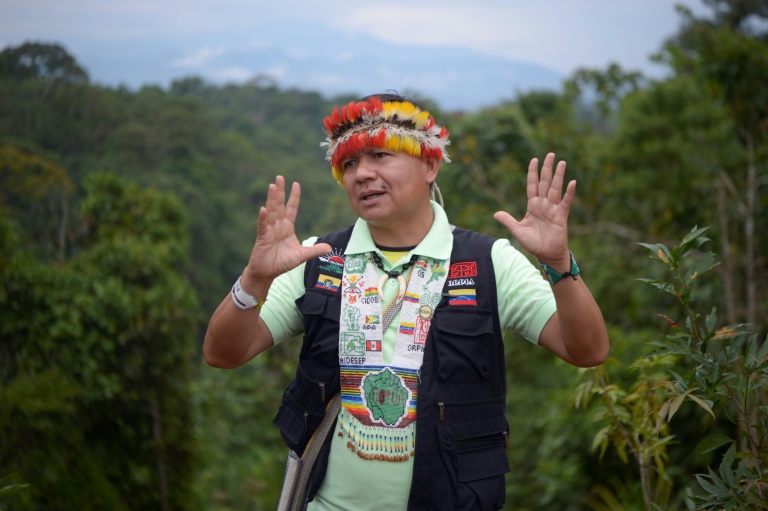Birds chirp near a river in the Ecuadorian jungle, five hours from the capital Quito, as Gregorio Mirabal expresses fear for the 500 tribes that often act as guardians of the Amazon rainforest and who face attacks, and even death, as a result.
Mirabel, the head of the Coordinator of Indigenous Organizations of the Amazon River Basin (COICA), calls on developed nations who will gather at the COP26 — the climate conference in Glasgow, Scotland — to collaborate with indigenous people to protect the 8.4 million square kilometers (3.2 million square miles) of the Amazon.
Mirabal is one representative of the 3.5 million indigenous people of the Amazon, who live across nine countries and territories — Brazil, Bolivia, Peru, Ecuador, Colombia, Venezuela, Guyana, Suriname and French Guiana.
A member of the Wakuenai Kurripaco people, Mirabal, 54, says that 17 percent of the forest has already been wiped out by oil and mineral exploitation, as well as pollution and deforestation for agriculture and livestock.
— How do you see the future of the Amazon? —
There are two scenarios: (one is the) apocalypse, with no return. People will run out of oxygen, the planet will warm up in 50 years, by two or even three degrees. Life on this planet will not be possible if the Amazon disappears.
The other scenario (is) that our children can bathe in this river, learn about what is here, see the trees, the biodiversity, see this macaw fly. This is the scenario we propose to the world if it helps us protect 80 percent of the Amazon.
— Is the damage reversible? —
If Amazon deforestation reaches 20 percent, it will be very difficult to go back. The desertification, the lack of water, the fires will devastate the Amazon. We are at a turning point.
The Amazon is being murdered, its oil, its natural resources are being taken away, and they don’t want to leave the forest alive. They want to raze it. This is a cry from the forest, we say enough is enough!
— Why is it important to protect the Amazon? —
It’s one of the largest reserves of fresh water on the planet. It has the greatest biodiversity in the world, which guarantees the balance of the climate. Each tree generates clean air and collects the waste that comes from other countries, from the pollution, but for this we receive nothing.
If (world leaders) do not spend money on a missile but on the Amazon, that is fine with us. But this funding must be global, and distributed equally among the nine countries.
But there is no clear funding today in this sense. We don’t know how much money has been invested in the Amazon, if it gets here and when.
The vaccine (against Covid-19) still has not arrived in the communities, and it has been two years since the pandemic broke out. If we depended on governments, we would be dead already.
— What are the greatest dangers you face? —
The worst danger is our governments’ lack of political will, which goes hand-in-hand with corruption, the non-enforcement of our rights.
Developed countries must consider the Amazon as a territory that also supports them. We want to protect the Amazon to protect humanity.
— Who are the Amazon’s biggest enemies? —
The big banks of the planet are financing the destruction of the Amazon by providing the resources for oil exploitation and other forms of predatory activities.
It’s also up to our conscience to stop consuming so much plastic, so much energy. We do not realize that human beings have become the worst enemy of nature and life itself.
Brazil represents almost 60 percent of the whole Amazon basin. With President Jair Bolsonaro, deforestation, illegal mining and the killing of our brothers and sisters have increased. This is the worst government we have in the Amazon basin.
— Where is there the most risk for environmentalists? —
Brazil and Colombia are among the most dangerous places in the world if you’re a conservationist or indigenous leader.
Then comes Peru. This is because activists oppose oil, mining or logging companies. In 2020, there were 202 murders in the Amazon. The figure for 2019, which was 135, has been exceeded.









